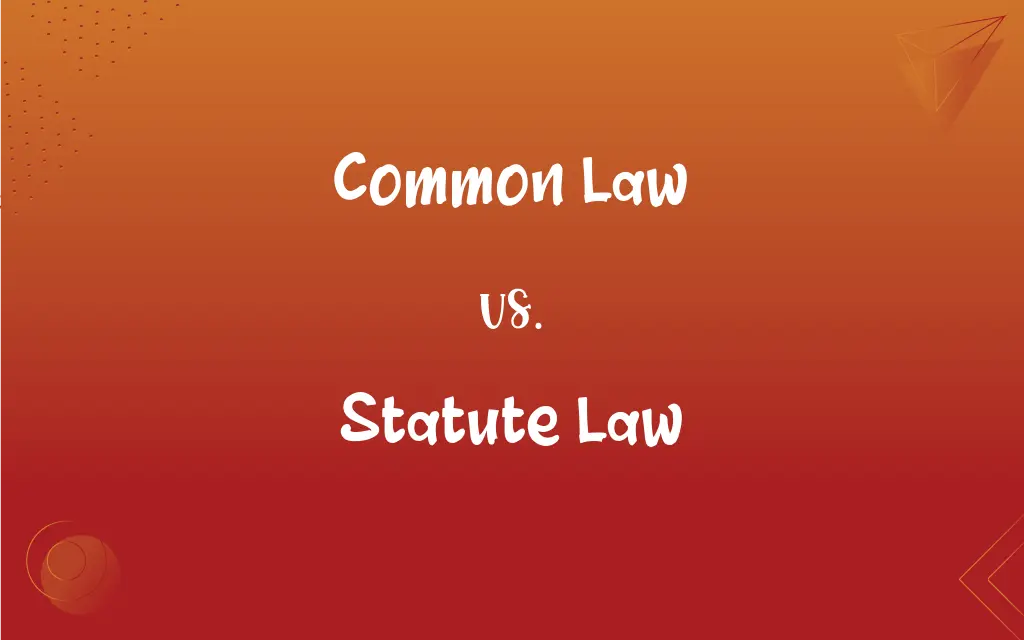Common Law vs. Statute Law: What's the Difference?
Edited by Aimie Carlson || By Harlon Moss || Updated on October 6, 2023
Common law is developed through judicial decisions and precedents, whereas statute law is legislation enacted by a legislative body.

Key Differences
Common law and statute law play critical roles in the legal system, operating in tandem yet originating from distinct sources. Common law, often also referred to as case law or judge-made law, is established and developed through court decisions. It arises from decisions made by judges in individual legal cases, creating precedents that future cases can refer to. Statute law, on the other hand, comprises laws that have been formally enacted by legislative bodies, such as parliaments or congresses. Therefore, common law derives from judicial decisions, while statute law originates from formal legislative processes.
These two forms of law also exhibit divergences in their application and modification. Common law evolves organically through subsequent judicial decisions, adapting and morphing as newer decisions either uphold or diverge from established precedents. In contrast, statute law remains rigid and constant until it is formally amended or repealed by a legislative body. Thus, while common law showcases a dynamic evolution based on ongoing judicial deliberations, statute law represents a more stable and static form of legal governance until legislatively altered.
In terms of hierarchy and authority, statute law typically takes precedence over common law. Should there be a conflict between a statutory provision and a common law principle, the statute will generally override the common law. This underlines a key difference in the authority and precedence between common law and statute law, emphasizing the legislator’s intent as paramount, while judicial decisions serve to interpret and fill gaps within statutory provisions.
Interpretation is another area where common law and statute law diverge notably. Judges, when making decisions that form common law, often have a degree of flexibility and discretion in their interpretations, especially in areas where statute law may be silent or ambiguous. Conversely, statute law demands adherence to the exact wording and intent of the legislation, leaving less room for interpretive flexibility. Consequently, common law can often adapt to novel or unprecedented situations with greater fluidity, while statute law provides a fixed and clear-cut directive.
Despite their differences, common law and statute law often interact and interplay within legal systems, each serving to complement and supplement the other. The former often fills gaps and addresses nuances not covered by statute law, providing solutions in the absence of specific legislative direction. The latter, meanwhile, sets clear, overarching legal and regulatory frameworks that govern broad areas of law, ensuring clarity and consistency. Both, despite their distinctions, collectively forge a comprehensive legal framework that endeavors to administer justice and regulate conduct within a jurisdiction.
ADVERTISEMENT
Comparison Chart
Origin
Arises from judicial decisions.
Enacted by a legislative body.
Flexibility
Evolves through new judicial decisions.
Remains constant until amended/repealed.
Authority
Generally superseded by statute law.
Takes precedence over common law.
Interpretation
Judges have interpretive flexibility.
Adherence to legislative wording/intent.
Application Areas
Fills gaps and addresses nuances.
Provides clear, broad legal frameworks.
ADVERTISEMENT
Common Law and Statute Law Definitions
Common Law
Common law provides solutions in areas where statutory law may be silent or ambiguous.
In the absence of specific legislation, common law steps in to provide resolution in disputes.
Statute Law
Statute law encompasses laws formally enacted through legislative processes.
Tax rates are often determined through statute law, defining how citizens are taxed on their income.
Common Law
It involves legal principles set by judges in the decisions of individual cases.
Under common law, a precedent set by a higher court is generally binding on lower courts.
Statute Law
Statute laws provide clear, specified legal standards, procedures, and principles.
In many nations, immigration policies are detailed and delineated through specific statute law.
Common Law
It creates legal precedents that guide future court decisions and disputes.
Common law relies heavily on past judgments to ensure consistency in future legal decisions.
Statute Law
Statute law refers to written laws passed by a legislative body.
The Civil Rights Act is a notable statute law aimed at eliminating discrimination in the United States.
Common Law
Common law is developed through judicial decisions and practices over time.
The principle of stare decisis, adhering to previous rulings, is pivotal in common law.
Statute Law
It consists of laws that are codified and established by official legislation.
Countries may enact statute law to regulate environmental protections and sustainability practices.
Common Law
Common law adapts and evolves through continuous interpretation and application in various cases.
Over decades, common law has gradually adapted to reflect changes in societal values and norms.
Statute Law
Statute law establishes legal norms and regulations that must be adhered to by the governed populace.
Statute law ensures that legal age requirements are adhered to in various aspects like voting or driving.
FAQs
Can common law override statute law?
Typically, statute law takes precedence and can override common law when conflicts arise.
How does common law resolve disputes?
Common law resolves disputes by referring to and considering precedents set in previous, similar cases.
How does common law evolve?
Common law evolves through judicial decisions, where judges create and interpret laws during case rulings.
Is common law flexible?
Yes, common law is often considered more flexible as it can adapt through ongoing judicial decisions.
What provides the basis for common law?
The basis for common law is judicial decisions and established precedents in prior legal cases.
What happens when statute law and common law conflict?
Generally, statute law takes precedence when there’s a conflict between statute law and common law.
Can statute law be influenced by common law?
Yes, statute law can be influenced by common law, especially when legislation aims to codify existing precedents.
Can both common law and statute law coexist in a legal system?
Yes, common law and statute law often coexist, with each addressing different aspects and gaps in the legal framework.
How rigid is statute law?
Statute law tends to be rigid and remains constant until formally amended or repealed by legislation.
Can statute law be unwritten?
No, statute law is always written and codified, providing clear and explicit legal direction.
What is common law?
Common law is a legal system where laws evolve through judicial decisions and case law precedents.
How is statute law created?
Statute law is created through formal legislative processes and is documented in legal codes.
What role does precedent play in common law?
In common law, precedent (past judicial decisions) guides and informs future rulings and legal decisions.
What is a statutory law example?
An example of statutory law could be the Americans with Disabilities Act in the United States.
How does statute law address crime?
Statute law defines criminal activities, establishes penalties, and sets procedures for legal proceedings.
How is statute law defined?
Statute law refers to laws that are written and enacted by a legislative body, such as parliament.
Does common law exist globally?
Common law systems are present globally but are most prominent in countries like the USA, UK, and Australia.
Where is statute law recorded?
Statute law is recorded and compiled in statutory codes, which are accessible to the public.
Is common law applicable to all types of cases?
Common law is applicable in many cases but can be overridden by statute law in certain situations.
How does common law affect personal rights?
Common law can protect or establish personal rights through the creation of precedents in various legal cases.
About Author
Written by
Harlon MossHarlon is a seasoned quality moderator and accomplished content writer for Difference Wiki. An alumnus of the prestigious University of California, he earned his degree in Computer Science. Leveraging his academic background, Harlon brings a meticulous and informed perspective to his work, ensuring content accuracy and excellence.
Edited by
Aimie CarlsonAimie Carlson, holding a master's degree in English literature, is a fervent English language enthusiast. She lends her writing talents to Difference Wiki, a prominent website that specializes in comparisons, offering readers insightful analyses that both captivate and inform.
































































